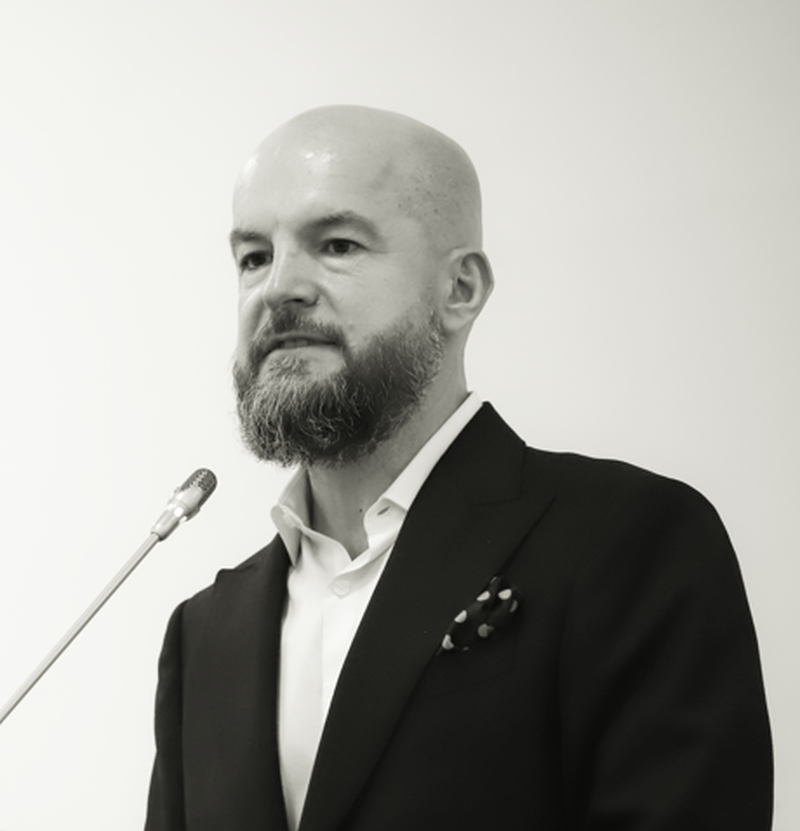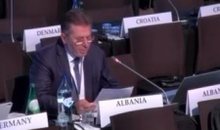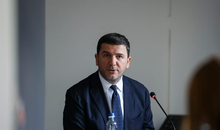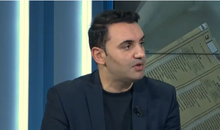
 Flash News
Flash News
Accident at "Shkalla e Tujanit", truck overturns in the middle of the road, driver injured
Vlora by-pass, work delays and cost increases
Milan are expected to give up on the transfer of Granit Xhaka
Inceneratori jashtë funksionit, përfshihet nga flakët fusha e mbetjeve në Elbasan
Accident on the Lezhë-Shëngjin axis, one injured

Alfred Lela
The electoral campaign in Albania is almost shapeless. Its physiognomy is lost in three battle trenches, where political wings are lining up to demand Albanians' attention, trust, confusion, or vote on May 11th.
In one trench, Edi Rama, alone, with 12 years behind him - and a passport that shows him off - is the great absentee of this campaign. When you look at his morning agenda, the numerous meetings stand out, and you think it is a campaign taken seriously. When he walks from one activity to another, you realize everyone is the same. It is Rama and the passport. What is missing is the confrontation with 12 years of governance, whether in retrospective or prospective form. Rama does not talk about what he has done in a decade, but about what he will do in the next.
Rama has cleared the field of his opponent. In the sense that he does not enter into a debate with his rival, does not allow ministers to go to the TV studio with his opponents, does not present a balanced view of governance, and does not balance this with the public or interest groups. He even calls the fact that there are MPs, ministers, and mayors arrested for corruption a success of his government.
Edi Rama has emptied politics and campaigning of meaning.
His campaign is atypical, conceived as a NETFLIX series, not a presentation of the program, and a confrontation with the record of 12 years of governance. It can be entertaining, but the citizenry begins when they understand that they must separate the fun from management, governance, and politics.
In a second block are listed the mini-parties, or small parties, that call themselves 'new', but demonstrate old typologies. They, too, are without a campaign. First, because they do not have the muscles to cope with major national campaigns. Second, because even though they legitimize themselves as formations that were set up to overthrow the cult of the leader, they reshape and re-present precisely this cult. Who knows anyone else in Agron Shehaj's Mundësia or Arlind Qori's Lëvizja Bashkë. In addition, stuck in the trap of self-definition as 'different from the old ones', these mini-parties make the big mistake of packaging the two big parties into a single opponent. This amnesties the 12-year-old government and erodes the opposition of the barricades, the one that - for better or worse - has made the resistance to this government the longest, most costly, and most productive. If politically it is myopic, intellectually it is dishonest. Instead of investing heavily in a majority, even a fragile one, for Berisha, where they would be part as a condition, they contribute to maintaining an unknown majority what form it will take, about them or to society. It is known: like the scientist's Frankenstein, like any monster, it will grow and will first strike those who helped in its production, including the leaders of the mini-parties.
In a political theater with a strong majority, mini-parties are minimized even more, to the point of losing meaning. The big leaders of small parties should look to authoritarian countries, or the hybrid democracies in the east of our continent, for this.
There is no talk of their program, or rather, not even the mini-parties talk about it, because presenting a program identifies them as a governing force. Since they lack muscle and support, the only form that would make them a governing party is an alliance with one of the two major parties.
Coming to Sali Berisha's Democratic Party, which seems strange because it is the only one that operates as a classic political campaign party. With a clear program, with tireless elaboration, with direct meetings with citizens, in open public places, Sali Berisha has returned as a serious politician with the idea of the state and statism and the seriousness enough to make it a reality.
He is open to debate, takes questions from journalists several times a week at headquarters or after various activities in Tirana and the districts, and other party associates request debate with SP rivals.
The opponent is missing.
In this sense, the Democratic Party is the only one that campaigns and is campaigning. The other two blocs are not interested in campaigning. The PS because it has nothing to show for the past, and the mini-parties because they have nothing to offer for the future.
Latest news








Golem and Qerret without water at the peak of the tourist season
2025-07-01 21:09:32

Euractiv: Italy-Albania migrant deal faces biggest legal challenge yet
2025-07-01 20:53:38
BIRN: Brataj and Fevziu victims of a 'deepfake' on Facebook
2025-07-01 20:44:00

Vlora by-pass, work delays and cost increases
2025-07-01 20:24:29



Milan are expected to give up on the transfer of Granit Xhaka
2025-07-01 19:41:25


The silent but rapid fading of the towers' euphoria
2025-07-01 18:58:07
Donald Trump's daughter says 'goodbye' to June with photos from Vlora
2025-07-01 18:48:47

Tirana vote recount, Alimehmeti: CEC defended manipulation
2025-07-01 18:15:05

Left Flamurtari, striker signs with another Albanian club
2025-07-01 17:43:14
Accident on the Lezhë-Shëngjin axis, one injured
2025-07-01 17:19:35
June temperature records, Italy limits outdoor work
2025-07-01 17:03:15

Meet Kozeta Miliku, named one of the top five scientists in Canada
2025-07-01 16:32:12
"Arsonist" arrested for repeatedly setting fires in Vlora (NAME)
2025-07-01 16:29:45

The ecological integrity of the Vjosa River risks remaining on paper
2025-07-01 16:09:40
Heat Headache/ Causes, Symptoms and Measures You Should Take
2025-07-01 16:01:13
UN: The world must learn to live with heat waves
2025-07-01 15:54:50

Three cars collide in Tirana, one of them catches fire
2025-07-01 15:38:16

Shehu: Whoever doesn't want Berisha, doesn't want the opposition 'war'!
2025-07-01 15:19:20
Berisha requests the OSCE Assembly: Help my nation vote freely
2025-07-01 15:11:46
Be careful with medications: Some of them can harm your sex life
2025-07-01 15:00:32

'Golden Bullet'/ Lawyers leave the courtroom, Altin Ndoc's trial postponed again
2025-07-01 14:44:52
EU changes leadership, Kosovo in a number of places
2025-07-01 14:40:01
Should we drink a lot of water? Experts are surprised: You risk hyponatremia
2025-07-01 14:30:20



Lëpusha beyond Rama's postcards: A village that is being silently abandoned
2025-07-01 13:41:56
Scorching temperatures in France close the Eiffel Tower
2025-07-01 13:29:35
Media: China, Iran and North Korea, a threat to European security
2025-07-01 13:20:12
Albania drops in global index: Less calm, more insecure
2025-07-01 13:09:35
Road collapses, 5 villages in Martanesh risk being isolated
2025-07-01 13:03:04

Këlliçi: Opposition action to be decided in September
2025-07-01 12:48:49
Four tips for coping with the heat wave
2025-07-01 12:38:53
Car hits pedestrian on Transbalkan road
2025-07-01 12:27:09
Authors of 9 robberies, Erjon Sopoti and Abdullah Zyberi arrested
2025-07-01 12:15:56

He abused his minor daughter, this is a 36-year-old man in custody in Fier
2025-07-01 11:50:34
The constitution of the Kosovo Assembly fails for the 40th time
2025-07-01 11:40:08




EU confirms support for the Western Balkans
2025-07-01 10:50:45
Serious in Fier! Father sexually abuses his minor daughter
2025-07-01 10:32:33
One year since the passing of the colossus of Albanian literature, Ismail Kadare
2025-07-01 10:25:26


They supplied the 'spaçators' with drugs, two young men are arrested in Tirana
2025-07-01 09:54:09
Europe is "scorching", how dangerous are high temperatures?
2025-07-01 09:48:56


Nigel Farage in Albania: but why?
2025-07-01 09:13:12
Xama: The "Partizani" dossier is quite weak and without facts!
2025-07-01 09:04:47

Foreign exchange, the rate at which foreign currencies are sold and bought
2025-07-01 08:35:39
Fabricators again warn of factory closures and job cuts
2025-07-01 08:21:30
Horoscope, what do the stars have in store for you today?
2025-07-01 08:08:59
Scorching hot, temperatures reaching 40°C
2025-07-01 07:57:12
Morning Post/ In 2 lines: What mattered yesterday in Albania
2025-07-01 07:42:59
Recount after May 11, Braho: I had no expectations for massive vote trafficking
2025-06-30 22:54:18

Second hearing on the protected areas law, Zhupa: Unconstitutional and dangerous
2025-06-30 22:18:46



Israel-Iran conflict, Bushati: Albanians should be concerned
2025-06-30 21:32:42

Fuga: Journalism in Albania today in severe crisis
2025-06-30 21:07:11
"There is no room for panic"/ Moore: Serbia does not dare to attack Kosovo!
2025-06-30 20:49:53

Temperatures above 40 degrees, France closes nuclear plants and schools
2025-06-30 20:28:42
Lavrov: NATO is risking self-destruction with new military budget
2025-06-30 20:13:54
Turkey against the "Bektashi state" in Albania: Give up this idea!
2025-06-30 20:03:24

Accused of sexual abuse, producer Diddy awaits court decision
2025-06-30 19:40:44


